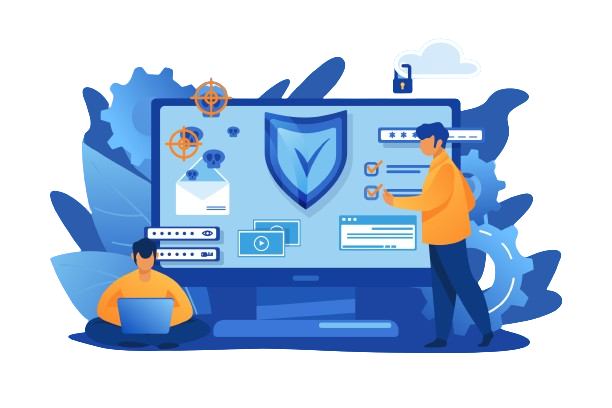
In the difficult landscape of the virtual age, wherein the ubiquity of the era intersects with the relentless evolution of cyber threats, safeguarding sensitive information has become paramount for corporations across the globe. The growing sophistication of cyber-assaults necessitates a strong cybersecurity method, prompting many agencies to explore revolutionary solutions. Among these solutions, the idea of cybersecurity outsourcing has emerged as a strategic avenue for bolstering defences and staying in advance of adversaries.
Understanding Cybersecurity Outsourcing
In an era wherein the digital realm intertwines seamlessly with every side of present-day business, the fortification of cybersecurity defences has developed from a desire to a vital. Recognizing the complexity of cyber threats and the necessity for a proactive protection mechanism, corporations are increasingly turning to cybersecurity outsourcing as a strategic method. Before delving into the nuances of this paradigm shift, it’s vital to set up a complete understanding of what cybersecurity outsourcing includes.
Definition and Scope
Cybersecurity outsourcing entails the delegation of specific cybersecurity tasks or the whole lot of an agency’s cybersecurity operations to external carrier carriers. This can embody a variety of services, inclusive of, however now, not restricted to risk tracking, vulnerability checks, incident reaction, and protection audits, by entrusting these vital capabilities to specialised 0.33-party entities, organisations intention to beautify their usual security posture whilst focusing on their centre competencies.
The scope of cybersecurity outsourcing extends beyond mere danger mitigation; it addresses the developing complexity of cyber threats that often surpass the skills of in-house groups. This strategic decision lets organisations tap into the specialised knowledge and assets of cybersecurity experts, thereby navigating the ever-evolving panorama of cyber risks more efficiently.
Advantages of Outsourcing Cybersecurity
1. Cost-effectiveness and Scalability
Outsourcing affords a price-green opportunity to preserve an in-house cybersecurity group. Organizations can scale their cybersecurity efforts up or down primarily based on contemporary needs without the constant fees associated with complete-time personnel.
2. Access to Specialized Expertise
Cybersecurity service providers regularly bring an intensity of knowledge that may be difficult to cultivate internally. These professionals live abreast of the state-of-the-art threats, technology, and compliance necessities, making sure of a proactive and adaptive defense strategy.
3. Improved Focus on Core Business Functions
By offloading cybersecurity duties, corporations can direct their attention and sources closer to centre enterprise functions. This no longer enhances performance but allows for greater strategic allocation of sources.
As businesses embark on the adventure of outsourcing their cybersecurity endeavours, information on the advantages and scope of this approach becomes pivotal in making informed selections that align with broader organisational goals. The next sections of this article will delve into the key concepts that underscore successful cybersecurity outsourcing and the established order of belief in those crucial partnerships.
The Key Principles of Cybersecurity Outsourcing
In the realm of cybersecurity outsourcing, fulfilment hinges on adherence to a set of essential ideas that govern the dynamics of those strategic partnerships whether groups are thinking about outsourcing precise cybersecurity functions or entrusting a whole lot of their digital defences to external entities, certain core concepts must be recognized and incorporated into the material of the collaboration.
1. Risk Assessment and Management
Before embarking on the journey of cybersecurity outsourcing, agencies should conduct a thorough chance evaluation. This includes identifying and comparing potential threats, vulnerabilities, and the impact of a protection breach. A complete change management method should then be mounted to mitigate those dangers successfully.
Key Components
- Risk Identification: Identifying capacity cybersecurity dangers particular to the corporation’s enterprise, operations, and digital infrastructure.
- Risk Evaluation: Assessing the likelihood and potential effect of identified risks on commercial enterprise operations.
- Risk Mitigation: Implementing measures to lessen the impact of identified dangers, inclusive of safety controls, encryption, and regular security audits.
2. Compliance and Regulatory Adherence
Cybersecurity outsourcing partnerships ought to align with enterprise guidelines and compliance standards applicable to the company. This entails making sure that the outsourcing issuer adheres to installed frameworks and felony necessities governing records protection, privacy, and cybersecurity.
Key Features
- Legal Compliance: Ensuring that the outsourcing companion complies with regional and international laws related to records safety and cybersecurity.
- Industry Standards: Adhering to specific enterprise standards and frameworks, which include GDPR, HIPAA, or ISO/IEC 27001, primarily based on the character of the enterprise.
3. Continuous Monitoring and Improvement
The dynamic nature of cyber threats necessitates a proactive and evolving cybersecurity approach. Outsourcing partners ought to put in force non-stop monitoring mechanisms to come across and respond to potential threats in actual time. Furthermore, a commitment to non-stop development ensures that cybersecurity measures evolve along with rising threats.
Key Features
- Real-time Monitoring: Utilising superior technology for non-stop tracking of network traffic, device logs, and protection activities.
- Incident Response Planning: Establishing strong incident response plans to react promptly to security incidents and reduce their impact.
- Regular Assessments: Conduct periodic tests and audits to discover areas for improvement and ensure the effectiveness of security features.
These concepts shape the bedrock of a resilient cybersecurity outsourcing method, supplying businesses with a framework to navigate the complexities of virtual protection. However, the efficacy of those principles is contingent on a foundational element: acceptance as true. The subsequent sections will discover how trust is established and maintained within the context of cybersecurity outsourcing relationships.
Building Trust in Cybersecurity Outsourcing
The fulfilment of cybersecurity outsourcing hinges now not only on the effective application of sound concepts but similarly on the status quo and protection of agreement among the outsourcing organisation and its external partners. As sensitive information and crucial operations are entrusted to third-birthday celebration entities, constructing a foundation of belief becomes vital for the longevity and effectiveness of the cybersecurity outsourcing dating.
1. Selecting Reputable Partners
The adventure closer to building trust starts with the choice of reliable and trustworthy cybersecurity outsourcing partners. Thorough due diligence is important in the course of the accomplice selection technique, regarding a meticulous exam of the accomplice’s music report, enterprise reputation, and adherence to ethical business practices.
Key Features
- Background Checks: Conduct thorough historical past assessments on capability partners, which include assessing their history, consumer testimonials, and any instances of beyond-security breaches.
- Industry Reputation: Evaluating the companion’s status within the cybersecurity industry, thinking about factors inclusive of certifications, awards, and customer delight.
2. Transparency and Communication
Transparent communication is the linchpin of agreement in any commercial enterprise dating, and cybersecurity outsourcing is no exception. Establishing clear channels of verbal exchange, fostering openness, and offering everyday updates on cybersecurity measures make contributions to the development of a trusting and collaborative partnership.
Key Features
- Clear Expectations: Clearly define expectancies, responsibilities, and deliverables in the outsourcing agreement.
- Regular Reporting: Implementing everyday reporting mechanisms to keep the outsourcing organisation informed about the country of cybersecurity, ongoing activities, and any incidents.
3. Data Confidentiality and Privacy
Given the sensitive nature of cybersecurity operations, safeguarding information confidentiality and privacy is paramount. Building agreements necessitate strong measures to protect touchy information, and contractual agreements should explicitly define the expectancies and duties concerning information protection.
Key Features
- Encryption and Security Protocols: Implementing encryption and different safety protocols to guard records in the course of transmission and garage.
- Data Handling Policies: Clearly define how the outsourcing associate will cope with, process, and store touchy data, ensuring compliance with applicable rules.
4. Establishing Long-Term Relationships
Building consider is an iterative system that extends beyond the initial tiers of collaboration. Organisations should prioritise establishing lengthy-term relationships with their cybersecurity outsourcing companions, fostering surroundings of collaboration, shared desires, and mutual growth.
Key Features
- Regular Reviews: Conduct periodic critiques of the outsourcing dating to assess overall performance, cope with concerns, and pick out areas for development.
- Scalability and Adaptability: Ensuring that the outsourcing partnership is scalable and adaptable to the evolving wishes and challenges of the organisation.
In the complex panorama of cybersecurity outsourcing, agreeing is the cornerstone that fortifies the collaborative efforts between companies and their external companions. As the next sections of this newsletter spread, actual-global case research will offer insights into the success times of cybersecurity outsourcing, losing sight of the realistic utility of those principles and the tangible blessings they are able to yield.
Future Trends in Cybersecurity Outsourcing
As the virtual panorama evolves, so do the strategies and technologies employed in cybersecurity outsourcing. Organisations looking to live beforehand of cyber threats and optimise their security posture need to assume and adapt to rising developments. Here are some destiny developments which are shaping the panorama of cybersecurity outsourcing:
1. Integration of Artificial Intelligence (AI)
The integration of artificial intelligence (AI) is revolutionizing cybersecurity outsourcing. AI-driven technologies can examine good sized quantities of information, come across anomalies, and reply to threats in real-time, appreciably improving the performance and effectiveness of cybersecurity measures.
Key Impacts
- Advanced Threat Detection: AI algorithms can perceive patterns indicative of capacity threats, enabling proactive danger detection earlier than they amplify.
- Automated Incident Response: AI-powered gear facilitates quicker and more correct incident reactions, minimizing the effect of protection breaches.
- Machine Learning for Risk Assessment: Machine studying algorithms can analyze ancient data to assess dangers and vulnerabilities, aiding in the development of stronger risk control techniques.
2. Adaptation to Evolving Threats
The cybersecurity panorama is dynamic, with new threats and assault vectors constantly emerging. Future trends in outsourcing involve a proactive and adaptive method to evolving threats.
Key Strategies
- Threat Intelligence Integration: Outsourcing companions are more and more integrating hazard intelligence offerings to live informed approximately rising threats and vulnerabilities.
- Agile Security Measures: Adopting agile methodologies permits agencies to speedy adapt their cybersecurity strategies in response to new threats or adjustments in the business environment.
3. Specialized Niche Services
As cybersecurity becomes more specialised, outsourcing partners are supplying niche services tailored to particular industries or dangerous landscapes.
Key Strategies
- Healthcare Cybersecurity Services: Specialized outsourcing offerings designed to fulfil the specific cybersecurity demanding situations confronted via healthcare businesses, including compliance with healthcare guidelines.
- IoT Security Outsourcing: Services targeted at securing Internet of Things (IoT) devices and networks, addressing the increasing cybersecurity dangers associated with the proliferation of linked gadgets.
4. Cloud Security Management
With the developing adoption of cloud offerings, organisations are outsourcing the management of their cloud safety to specialised carriers.
Key Strategies
- Cloud Access Security Brokers (CASB): Outsourcing companions can also offer CASB services to reveal stable statistics as it moves among on-premises devices and the cloud.
- Identity and Access Management (IAM): Outsourcing IAM offerings to make sure they are stable and managed to get the right of entry to cloud assets.
5. Zero Trust Security Models
The Zero Trust security version, which assumes that no user or gadget may be relied on with the aid of default, is gaining prominence in outsourcing partnerships.
Key Strategies
- Continuous Authentication: Implementing non-stop authentication measures to verify consumer identities at some point in their interactions with systems.
- Micro-Segmentation: Dividing networks into smaller segments to limit lateral motion in case of a safety breach.
Embracing these destiny trends may be crucial for agencies looking to hold a robust cybersecurity posture through outsourcing. As technology continues to boost and threats turn out to be greater state-of-the-art, staying beforehand calls for a strategic and ahead-thinking method to cybersecurity outsourcing.
Conclusion
As companies navigate the ever-evolving landscape of cybersecurity threats, outsourcing has become a strategic imperative. The principles mentioned in this text underscore the importance of cautious consideration, hazard control, and constructing trust in cybersecurity outsourcing relationships.
By adhering to those concepts and staying abreast of enterprise developments, groups can strengthen their defenses and proactively respond to the dynamic, demanding situations of the digital age.
You May Also Like To Read: Top 10 Challenges for Cybersecurity in the Healthcare Industry




Leave a Comment